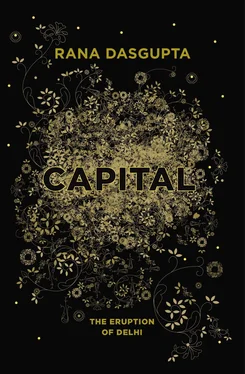It is impossible to communicate how remote and inaccessible this place is, though it is in the middle of one of the world’s largest cities. It is easy to understand how national borders might separate populations with very different access to the global economy but more difficult to conceive of how such divisions might run through a single city. But in this metropolis where many people are totally restructuring the global economy with their capital, ideas and labour, and where you can sometimes feel, therefore, that you are sitting where all the forces of the globe converge, there are populations that are entirely irrelevant to that system. Bhalswa is not a place of capitalist oppression — in fact, many of its residents would love a bit more of that. It is a place of unwanted lives, of people who can find almost no connection to the economic boom that surrounds them. They are a ‘surplus’ population that has nowhere to go, and all they can do is try to survive the shunting around from one trash pile to the next.
Meenakshi and I take the Metro to Connaught Place and sit in the Indian Coffee House, an institution set up in Nehru’s time and run by a national cooperative of coffee workers, where you can still find a hot drink for 5 rupees. 32Meenakshi will not order anything, however. She carries a flask of water in her backpack.
“My father came from a village in Uttarakhand. Our situation was like the people you met today. Farming was very precarious in our village. It was terrace farming, which doesn’t yield much food. It was very dependent on the rains. My grandfather died when my father was two, so my father and uncles did different kinds of work to earn a living: they grazed other people’s cattle and worked in other people’s fields. It was miserable and they were starving. When my father was seven, he ran away to Delhi with my uncle.
“At that time, people in the city were more genuine. A man who saw the plight of my father and my uncle took them to a Jain ashram, where they lived. They studied there. My father left his studies when he was fifteen and started working as a labourer. He cleared the bushes around the Old Fort and every day his hands bled terribly. Then he went to work in the house of a Muslim family in Aligarh. And then he was selected to work for the Intelligence Bureau.
“He never really told us what kind of work he did for them. He said he started out as a dishwasher. In the village they used to say, ‘He has a lot of attitude for a dishwasher!’ But he managed to get a training while he was doing such menial work, and eventually he was given proper responsibilities. When he retired from the Intelligence Bureau, he was an inspector.
“There were more opportunities in those days. Nowadays people would not get the kind of options my father got.
“While I was growing up, he was sent away from Delhi. He was posted to a village in the border regions, where his job was to arrest illegal immigrants. He pursued them ferociously. He had spies and informants who would give him information about people who had crossed the border illegally.
“I did not feel good in the village. I had to go to a school with a broken building and write on a small board. It was the only school for eight villages and even so there were only forty children in the school. I was the only girl in my class. We were taught under a tree. It was very awkward, the transition from the city school to the village school. I lagged behind and when I came back to Delhi, I failed in English. Even today, I am not confident enough to look into someone’s eyes and speak English.
“After high school, my father said I could not study further so I went to work in a factory. I was sixteen years old. It was a textiles factory and I was involved with some of the designs. I thought I wanted to do fashion design but it didn’t appeal to me at all. All I could think about was the women who worked there, who were in hell. They worked more than twelve hours a day and in return they got nothing. I organised for the workers to be given proper clothing to wear and campaigned for them to receive the minimum wage. For three years I fought with the company owner and finally we won, and the company granted them a fixed salary with a few holidays every year. Of course, they fired me and kept my salary. But it made me more confident and I did a lot of different things after that.
“Later on I went to do a degree at Delhi University and then a Master’s. But when I look back, I don’t find myself at par with the world. I feel far behind it. Had I studied in a good school and not wasted the crucial years of my life, I would have been a better person today. When I visualise myself in the world, I feel I have nowhere to stand.
“There are things we are born with. I have something in me, you have something in you. My thing is that I have always been alone. I have not met other people who think like me. I was always eating alone, sitting alone, thinking alone. When I was fifteen or sixteen, I started writing poems. When you are alone and you think that nobody understands you, you feel heavy. But when you put your thoughts on paper, you feel light.”
Meenakshi takes out a notebook and reads out some poems that she has written. They speak of terrible, destructive forces. A man at the table next to us is listening intently. He is enormously impressed by Meenakshi, whose masculine demeanour cannot conceal the fact that she is beautiful. He gets up to congratulate her and to ask her all about herself. He wants to sit at our table and talk to her. But her silence is formidable, and he retreats to where he came from.
She speaks about her childhood.
“In the village there used to be powerful people who would beat less powerful people. There were also many caste restrictions. I was a Brahmin and there were many things I could not do. If a Brahmin did manual work, another Brahmin could not eat his food. These things used to hurt my mind somehow. I saw the things that happened to girls and never to their brothers. When I came to the city, I was friends with a Muslim girl in my class. I used to eat her lunch and she used to eat mine. When I told my father, he said I had become no one, neither Hindu nor Muslim. Then I decided that I wouldn’t tell them anything. Slowly the thought of revolt sparked in me. I used to think about these things the whole night. I used to ask, ‘Who invented these boundaries? Why do they exist?’ But there was nobody to answer these questions. So this was what gave me new thinking.”
I suspect it would be difficult to get to know Meenakshi well. She is extraordinarily self-contained. Through the furious energy of her labour one can sense an intense but inchoate inner search. It refreshes me to hear her talk. She too is part of this city. She reminds me of what I love in the friends I have here: a fierce intelligence searching for a better arrangement of the world. This too is Delhi culture, but it is what you could call the city’s minor culture. It rarely rises to the surface of things.
“After my Master’s I started working for an NGO which sent me to work in Bhalswa. That changed my life.”
Meenakshi, whose father worked hard to provide for his family a middle-class life, finds her ultimate fulfilment in proximity to the poor. As she talks about the work she does for this community, I wonder in which direction the dependency goes: do they need her or does she need them?
Meenakshi found herself at ideological odds with the NGO she was working for. “They are not actually interested in people,” she says, “only in their own projects. Because it is projects that give them money, not people.” In the end her disagreements grew too much for the NGO, and she was fired. Remarkably, she carried on doing the same work for the Bhalswa community, now without position or salary.
Читать дальше











